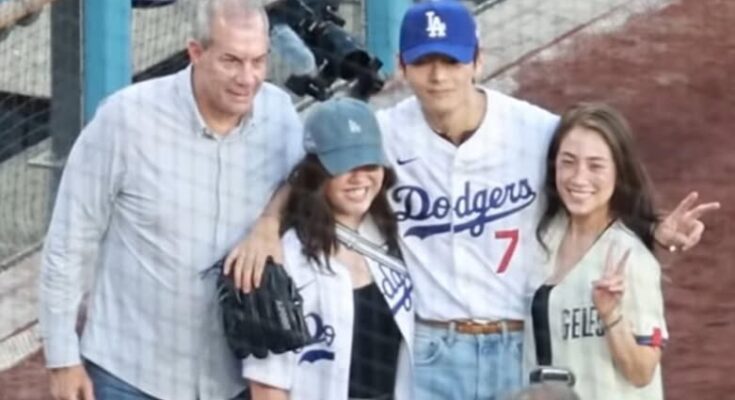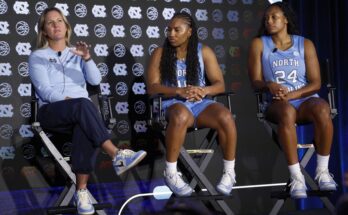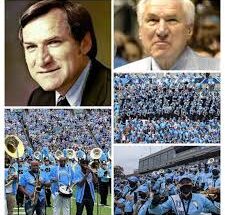Lon Rosen’s reputation in the world of sports marketing and management has always been one of sharp instincts, an innate understanding of what captures the public’s imagination, and a genuine ability to connect people with moments they will never forget. When he was spotted personally approaching Taehyung, the South Korean superstar widely known as a member of BTS, during a game to greet him and take a picture, it wasn’t just a simple interaction between a sports executive and a global celebrity. It was emblematic of what Rosen has always done best throughout his long career—bringing people together, merging cultural worlds, and creating touchpoints that transcend sports and entertainment. That moment was small in action but massive in symbolism. To understand its weight, one must first appreciate the stature of both individuals in their respective worlds and the way Rosen has used such opportunities to elevate entire franchises and brands.
Taehyung, as one of the most prominent global icons in music, fashion, and pop culture, represents a worldwide audience whose reach is unmatched. Fans travel across continents to catch a glimpse of him, and his presence anywhere draws attention far beyond that moment’s immediate context. For him to be at a game, soaking in the atmosphere of American sports, was already a headline in itself. For Rosen, whose job has always been about maximizing visibility, brand crossover, and cultural significance, it was second nature to see this as an opportunity to cement a connection. The greeting and photo were not just about politeness; they symbolized the Dodgers’ openness to being more than just a baseball team—they are a cultural institution willing to align with international stars who can bridge communities.
Rosen’s career history perfectly explains why such moments happen under his watch. His roots in marketing and public relations are not just limited to pushing out campaigns or generating hype. He has consistently played a central role in shaping how teams like the Los Angeles Lakers, the Los Angeles Kings, and the Los Angeles Dodgers present themselves to the world. In the early days of his work with the Lakers, he was instrumental in cultivating the “Showtime” era’s identity. That wasn’t just about Magic Johnson dazzling on the court—it was about packaging basketball into a Hollywood spectacle, where games were events, celebrities filled the seats, and the Lakers became part of Los Angeles culture, not just its sports culture. Rosen’s vision contributed to the Lakers becoming a brand as much as a team, one that resonated beyond wins and losses.
His time with the Los Angeles Kings revealed a similar gift for transformation. Hockey in Southern California was never going to be easy to market. It was a cold-weather sport in a sun-soaked city, and fans had little cultural connection to the game. Yet Rosen saw the value in rebranding, in making the Kings not just about the ice but about belonging to a lifestyle. He leaned into creating an atmosphere where fans could see hockey as entertainment, as part of their city identity. These instincts helped the Kings move closer to legitimacy in Los Angeles, laying a foundation for later moments of success when players like Wayne Gretzky would bring national attention. Rosen’s ability to shift the narrative and make a team culturally relevant proved critical.
When Rosen transitioned into his current role with the Dodgers, he inherited a franchise that already had historical weight but needed to modernize its cultural presentation. The Dodgers had one of the strongest fan bases in Major League Baseball, yet Rosen saw more than just a fan base—he saw a global opportunity. Los Angeles is one of the most diverse cities in the world, with Latino communities, Asian communities, and countless others making up its fabric. For Rosen, connecting the Dodgers to these communities on a deeper cultural level was not only logical but necessary. That is why seeing him approach Taehyung at a game felt like such a natural continuation of his philosophy. Here was a Korean megastar whose presence tapped into the massive Korean-American fan base in Los Angeles and the millions of international fans watching from afar. Rosen’s instinct to embrace that moment reflects his ability to understand how far-reaching those connections can be.
What makes Rosen’s approach remarkable is that it doesn’t come off as transactional. Many executives in sports and entertainment think in terms of deals, contracts, and campaigns, often losing sight of the human element that makes connections resonate. But Rosen has long been known for his personal touch. His decision to personally walk up to Taehyung, greet him, and pose for a photo wasn’t about orchestrating a press release or staging a publicity stunt. It was about authenticity. In doing so, Rosen underscored that the Dodgers are not only aware of Taehyung’s influence but are willing to embrace it directly, without layers of corporate distance. That photo alone carried enormous symbolic weight. For Taehyung’s fans, it was a sign that one of the most storied American baseball franchises valued him. For Dodgers fans, it was a sign that their team was culturally relevant in ways that reached beyond baseball.
Moments like this also illustrate how Rosen’s career has always been about creating an experience rather than just a product. When people attend a Lakers game, a Kings game, or a Dodgers game, they aren’t just buying a ticket to watch athletes perform. They are entering a carefully crafted environment where sports collide with entertainment, fashion, music, and celebrity culture. By ensuring that figures like Taehyung feel welcomed and integrated into that environment, Rosen strengthens the aura of those events. Fans will remember the game they attended not just for the score but because Taehyung was in attendance, greeted by one of the most respected marketing executives in sports. That is how moments become memories, and memories become traditions.
Rosen’s gesture toward Taehyung also reveals something about the evolving landscape of sports marketing itself. In earlier eras, the primary focus was on domestic fan bases. Teams concentrated on television deals, local sponsorships, and regional outreach. But in today’s globalized world, sports franchises are brands with international reach. Basketball teams like the Lakers and soccer teams like Real Madrid already lean heavily on international markets, selling jerseys across continents. Baseball, though deeply rooted in American culture, has been slower to embrace that global expansion. Rosen’s acknowledgment of Taehyung is a reminder that the Dodgers, under his guidance, are open to bridging that gap. With stars like Shohei Ohtani already drawing global attention from Japan, adding layers of connection through figures like Taehyung only enhances the Dodgers’ international footprint.
From a marketing standpoint, the image of Lon Rosen with Taehyung is a masterstroke. It shows accessibility, awareness, and inclusivity. It bridges generations, cultures, and industries. It also builds narrative capital, something Rosen has excelled at throughout his career. Narrative capital refers to those intangible storylines that keep people talking and emotionally invested. The Dodgers aren’t just winning or losing—they are part of a larger story where baseball collides with global culture. That makes the team relevant not just to die-hard baseball fans but to people who may have never watched a single inning yet feel drawn to the Dodgers because of moments like this.
One can also see the influence of Rosen’s long-standing relationships with celebrities and cultural figures in Los Angeles. His time with the Lakers during the Showtime era was defined by having stars like Jack Nicholson courtside, reinforcing the team’s identity as Hollywood’s team. Similarly, his ability to attract and welcome international figures to Dodgers games shows the same understanding of what it means to make a franchise culturally magnetic. By greeting Taehyung, Rosen continued that tradition, turning a baseball game into a place where culture and celebrity thrive.
Beyond the photo, the long-term implications are just as important. That single interaction will ripple through social media, fan communities, and international media coverage. BTS fans are known for their fierce loyalty and their ability to elevate moments into global talking points. For the Dodgers, that means exposure on platforms and in markets that might never have paid much attention to Major League Baseball. For Taehyung, it means further cementing his image as a figure embraced across industries. And for Rosen, it is yet another example of his ability to use small but meaningful interactions to shape the narrative of a franchise.
Rosen’s career has always balanced between strategic vision and personal execution. He understands the broad strokes of branding and marketing, yet he never loses sight of the details that make those strategies work in practice. Approaching Taehyung wasn’t a boardroom decision—it was a human decision. But it was also perfectly aligned with the larger vision of making the Dodgers more than just a team. It encapsulated the philosophy that sports franchises are cultural hubs, capable of resonating with people far beyond the confines of the stadium. That philosophy has guided him through his time with the Lakers, the Kings, and now the Dodgers, and it continues to shape the way these teams are perceived globally.
In the end, that single photo of Lon Rosen and Taehyung is more than a snapshot—it is a representation of decades of expertise in knowing how to connect sports with the broader currents of culture. It is a reminder that the leaders behind the scenes often shape the stories we tell about our favorite teams and the memories we associate with them. For Rosen, it was just another day of doing what he has always done: making sports bigger than sports. For Taehyung, it was another testament to his global influence. For the Dodgers, it was a masterclass in cultural relevance. And for everyone watching, it was a glimpse of how a simple gesture can embody the fusion of sport, entertainment, and global identity.



